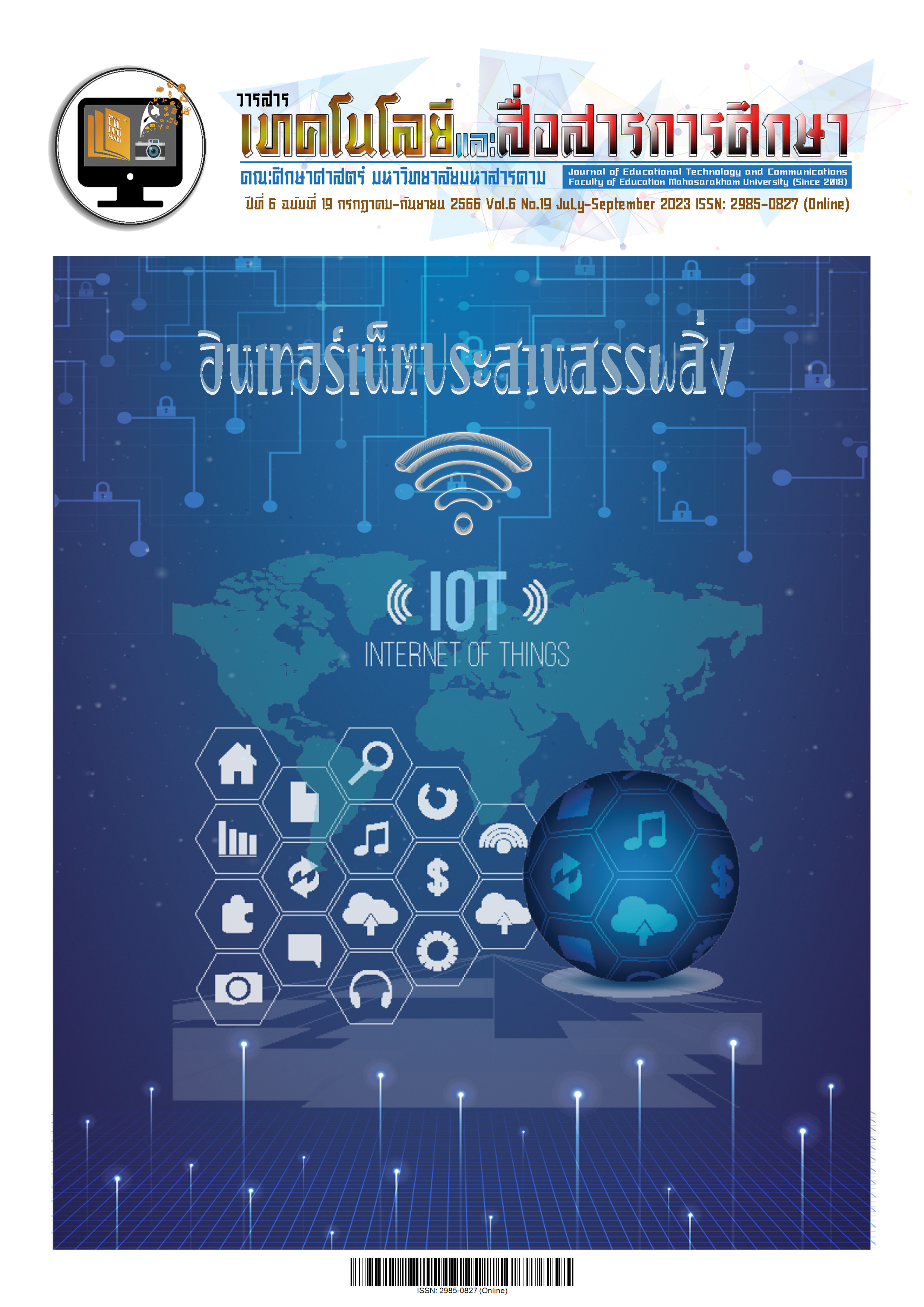การพัฒนากิจกรรมการเรียนรู้โดยใช้แนวคิดเชิงออกแบบโค้ดดิ้งโดยไม่ใช้เครื่องคอมพิวเตอร์ร่วมกับเทคโนโลยีโลกเสมเพื่อส่งเสริมความสามารถในการคิดวิเคราะห์ สำหรับนักเรียนชั้นประถมศึกษาปีที่ 6
Main Article Content
บทคัดย่อ
การวิจัยในครั้งนี้มีจุดมุ่งหมายเพื่อ 1) สร้างและหาประสิทธิภาพกิจกรรมการเรียนรู้โดยใช้แนวคิดเชิงออกแบบโค้ดดิ้งโดยไม่ใช้เครื่องคอมพิวเตอร์ ร่วมกับเทคโนโลยีโลกเสมือนจริง เพื่อส่งเสริมความสามารถในการคิดวิเคราะห์ ที่พัฒนาขึ้นตามเกณฑ์ 2) เพื่อเปรียบเทียบความสามารถในการคิดวิเคราะห์ก่อนเรียนและหลังเรียนโดยใช้แนวคิด เชิงออกแบบโค้ดดิ้งโดยไม่ใช้เครื่องคอมพิวเตอร์ ร่วมกับเทคโนโลยีโลกเสมือนจริง 3) เพื่อศึกษาความพึงพอใจของ ผู้เรียนด้วยการพัฒนากิจกรรมการเรียนรู้ กลุ่มตัวอย่างเป็นนักเรียนชั้นประถมศึกษาปีที่ 6 ภาคเรียนที่ 1 ปีการศึกษา 2565 โรงเรียนวัดหางไหล จำนวน 17 คน ได้มาการสุ่มตัวอย่างแบบง่าย (Simple Random Sampling) เครื่องมือ ที่ใช้ในการวิจัยได้แก่ แผนการจัดการเรียนรู้ กิจกรรมการเรียนรู้โดยใช้แนวคิดเชิงออกแบบ แบบทดสอบวัดความสามารถในการคิดวิเคราะห์ และแบบสอบถามความพึงพอใจของผู้เรียน สถิติที่ใช้ในการวิเคราะห์ข้อมูล ได้แก่ ค่าเฉลี่ย ค่าเบี่ยงเบนมาตรฐาน และทดสอบสมมติฐานโดยใช้สถิติทดสอบค่าที
ผลการศึกษาค้นคว้าพบว่า
1. กิจกรรมการเรียนรู้โดยใช้แนวคิดเชิงออกแบบโค้ดดิ้งโดยไม่ใช้เครื่องคอมพิวเตอร์ ร่วมกับเทคโนโลยี โลกเสมือนจริง เพื่อส่งเสริมความสามารถในการคิดวิเคราะห์ ที่สร้างขึ้นมีประสิทธิภาพ 81.03/80.78
2. นักเรียนชั้นประถมศึกษาปีที่ 6 มีความสามารถในการคิดวิเคราะห์หลังเรียนสูงกว่าก่อนเรียน อย่างมีนัยความสำคัญทางสถิติที่ระดับ .05
3. นักเรียนชั้นประถมศึกษาปีที่ 6 มีความพึงพอใจที่มีต่อกิจกรรมการเรียนรู้ โดยภาพรวมมีคะแนนเฉลี่ย อยู่ในระดับพอใจมากที่สุด โดยมีค่า (= 4.80, S.D.=0.44)
Downloads
Article Details
เอกสารอ้างอิง
กระทรวงศึกษาธิการ. (2560). หลักสูตรแกนกลางการศึกษาขั้นพื้นฐาน พุทธศักราช 2551 (ฉบับปรับปรุง พ.ศ.2560). โรงพิมพ์คุรุสภาลาดพร้าว.
กระทรวงศึกษาธิการ. (2564). Unplugged Coding (ประถม). สำนักพิมพ์สำนักงาน คณะกรรมการการศึกษาขั้นพื้นฐาน (สพฐ.)
กันต์ เอี่ยมอินทรา. (2562, 10 สิงหาคม) Computer Science Unplugged เรียนคอมฯแบบไม่ใช่คอมฯ. กรุงเทพธุรกิจ. https://www.bangkokbiznews.com/blogs/columnist/122878
ภูมิพัฒน์ ศัลยวุฒิิ และสุดคนึง นฤพนธ์จิรกุล การจัดการเรียนรู้โดยใช้แอปพลิเคชันทางดนตรีเพื่อพัฒนาทักษะ การบรรเลงกีตาร์คลาสสิก ของนักเรียนชั้นมัธยมศึกษาปีที่ 2. วารสารเทคโนโลยีและสื่อสารการศึกษา คณะศึกษาศาสตร์ มหาวิทยาลัยมหาสารคาม, 5(14), 47-58. https://so02.tci-thaijo.org/index.php/etcedumsujournal/article/view/252859
มานิตย์ อาษานอก. (2561). การบูรณาการการคิดเชิงออกแบบเพื่อพัฒนานวัตกรรมการจัดการเรียนรู้. วารสารเทคโนโลยีและสื่อสารการศึกษา คณะศึกษาศาสตร์ มหาวิทยาลัยมหาสารคาม, 1(1), 6-12. https://so02.tci-thaijo.org/index.php/etcedumsujournal/article/view/242283
สุมิตรา บูชา และสุมาลี ชูกำแพง. (2563). การพัฒนากิจกรรมการเรียนรู้รายวิชาชีววิทยาโดยใช้การคิดเชิงออกแบบร่วมกับแนวคิดการเรียนรู้แบบมีส่วนร่วมเพื่อส่งเสริมความคิดสร้างสรรค์ ของนักเรียนชั้นมัธยมศึกษาปีที่ 5. วารสารมหาจุฬานาครทรรศน์ มหาวิทยาลัยมหาจุฬาลงกรณราชวิทยาลัย วิทยาเขตนครศรีธรรมราช. 7(12) 210-220. https://so03.tci-thaijo.org/index.php/JMND/article/view/249108
ศราวุธ น้อยลา. (2564). การพัฒนาผลสัมฤทธิ์ทางการเรียนวิชาภาษาไทยเรื่อง ภาพพจน์ในวรรณคดีไทยโดยการเรียนรู้แบบเสริมต่อการเรียนรู้ผ่านเว็บไซต์ สำหรับนักเรียนชั้นประถมศึกษาปีที่ 6. [วิทยานิพนธ์ปริญญามหาบัณฑิต ม่ได้ตีพิมพ์] มหาวิทยาลัยนเรศวร
The Stanford d.School Bootcamp Bootleg (HPI). (2010). An Introduction to Design Thinking PROCESS GUIDE. https://dschool-old.stanford.edu/sandbox/groups/designresources/wiki/36873/attachments/74b3d/ModeGuideBOOTCAMP2010L.pdf
World Economic Forum. (2020). Shaping the Future of the New Economy and Society.


